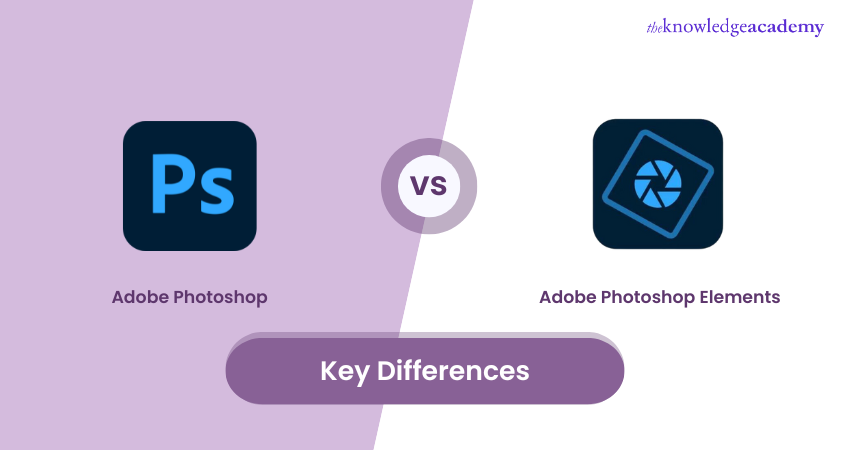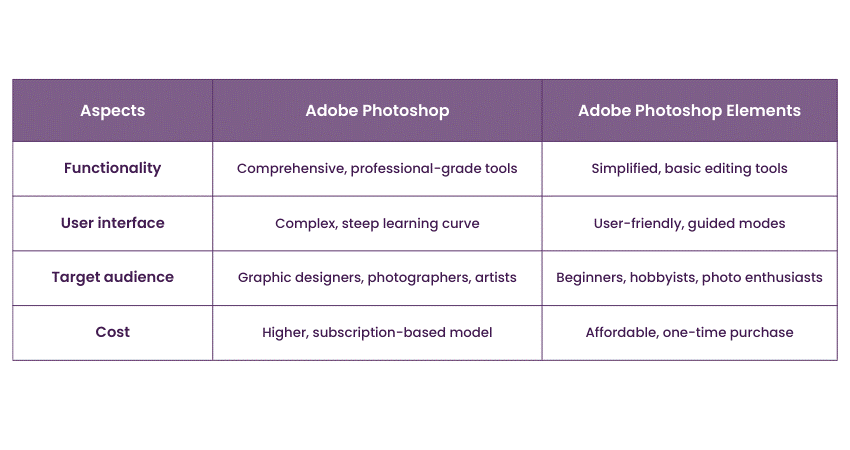We may not have the course you’re looking for. If you enquire or give us a call on +08000201623 and speak to our training experts, we may still be able to help with your training requirements.
Training Outcomes Within Your Budget!
We ensure quality, budget-alignment, and timely delivery by our expert instructors.

A picture says a thousand words, but the right editing tool can help those words narrate a mesmerising story. Adobe Photoshop and Adobe Photoshop Elements have been stalwarts in the realm of image editing, helping designers express their ideas for years. However, artists often stand at crossroads while selecting the right tool, but not anymore. In this blog, we will provide a detailed comparison of Adobe Photoshop vs Adobe Photoshop Elements based on several parameters and explore their pros and cons.
Table of Contents
1) What is Adobe Photoshop?
2) What is Adobe Photoshop Elements?
3) Adobe Photoshop vs Adobe Photoshop Elements: A comparative analysis
4) Adobe Photoshop vs Adobe Photoshop Elements: Pros and Cons
5) Conclusion
What is Adobe Photoshop?
Adobe Photoshop, a universally accepted as the industry-standard image editing software, is the powerhouse of the design world. Its robust set of editing features caters to numerous tasks, including the following:
a) Photo retouching
b) Creating complex digital paintings
c) Developing 3D designs
d) Crafting intricate web designs
These tools enable professionals to construct or deconstruct visuals in whatever way they see fit, opening up a world of endless possibilities. However, its sophistication may be overwhelming for beginners.

What is Adobe Photoshop Elements?
Adobe Photoshop Elements is a streamlined version of Photoshop that targets photography enthusiasts and beginners. It provides users with the core editing tools, incorporating an interface designed for easier navigation and operation. Unlike its professional counterpart, Photoshop Elements emphasises automatic features and guided edits, making it far less intimidating for novices.
Transform your passion into expertise! Our Adobe Training will guide you in mastering the art of digital design.
Adobe Photoshop vs Adobe Photoshop Elements: A comparative analysis
In the quest to identify the most suitable editing tool between Photoshop vs Photoshop Elements, it becomes crucial to delve into a detailed comparative analysis. By focusing on aspects like functionality, user interface, target audience, and cost, users can make an informed decision, which can significantly impact their photo-editing journey. So, let’s have a look at their key differences:

Functionality
Photoshop sits on the throne for designing tools when functionality is concerned, boasting a vast selection of features. Its features are expansive and cover tasks from basic photo retouching to complicated graphic design, digital painting, and 3D modelling. Photoshop also consists of video editing functions, which help users apply edits and effects on video files – a feature that did not exist in Photoshop Elements. More than that, it supports a bigger number of file formats, which helps provide users with flexibility.
In contrast, Photoshop Elements is more pared-down but does not compromise on delivering the core functionalities. It includes essential features such as cropping, adjusting brightness and contrast, red-eye removal, and basic layer manipulation.
What truly sets Photoshop Elements apart is its automatic features. These features include automatic colour correction, selection tools, and the AI-driven 'Auto Creations' that create unique collages and slideshows.
User interface
The user interface significantly contributes to the overall user experience, and Photoshop vs Photoshop Elements present contrasting scenarios. Photoshop's interface, packed with panels, menus, and toolbars, can be daunting for beginners. However, once mastered, this interface provides unparalleled access to various tools, fostering creative liberty.
On the other hand, Photoshop Elements offers a more user-friendly interface designed for easier navigation. The program is divided into three modes that are follows:
a) Quick: Offers basic editing tools for fast edits
b) Guided: Provides step-by-step instructions for more advanced edits
c) Expert: allows for manual control over all tools
Target audience
Adobe Photoshop is suited for professionals, including Graphic Designers, Photographers, and Digital Artists, who require advanced editing tools and more granular control over their edits. Its vast features cater to a broad spectrum of tasks, enabling professionals to translate their imaginative ideas into captivating visuals.
On the contrary, Photoshop Elements primarily serves photography enthusiasts, beginners, and those looking for simplicity over complexity. It's perfect for users who want to do quick photo enhancements and create keepsakes like scrapbook pages and greeting cards without having to delve into the intricacies of photo editing.
Cost
Price is another pivotal factor in this comparison. Adobe Photoshop operates on a subscription-based model and is more expensive than Photoshop Elements, which is available for a one-time purchase. Photoshop's pricing may seem hefty, especially for amateurs or those with casual editing needs. However, for professionals, this investment can prove to be invaluable, given the comprehensive toolkit Photoshop offers.
Conversely, Photoshop Elements comes at a lower, more affordable price, reflecting its target audience—casual users and beginners. For individuals looking for essential editing tools without the added complexity, Elements provides excellent value for money.
Unleash your creative potential today with our Adobe Illustrator Training – where creativity meets skill!
Adobe Photoshop vs Adobe Photoshop Elements: What are the pros and cons?
Many people often ask, “Is Photoshop Elements easier than Photoshop?” To know the answer to that question, we need to be well-versed in both their pros and cons. So, let’s have a look at them in detail:
Adobe Photoshop
The following are some of the pros and cons of Photoshop:
Pros:
1) Comprehensive feature set: Photoshop is armed with a plethora of features. From simple tasks such as photo retouching to complex tasks like 3D modelling, Photoshop has it all covered.
2) Highly customisable: Photoshop provides a vast array of customisation options, including custom brushes and patterns. These options give users more control over their work.
3) Versatile file support: Adobe Photoshop supports numerous file formats, from the standard JPEG and PNG files to specialist formats like PSD (Photoshop Document) and even animation/video files.
4) Advanced tools: Photoshop includes advanced tools such as Layer Styles, the Pen tool, Channels, and much more. These tools can help create intricate and detailed designs.
Cons:
1) Steep learning curve: Photoshop's wide range of tools and capabilities can be overwhelming for beginners. Its user interface, while highly functional, is complex and requires time and patience to master.
2) Expensive: Photoshop operates on a subscription model, making it significantly more expensive than Elements, which is available as a one-time purchase.
3) Heavy on resources: Due to its extensive features, Photoshop is a demanding application. It requires a powerful computer to function smoothly.
Adobe Photoshop Elements
The following are some of the pros and cons of Photoshop Elements:
Pros:
1) User-friendly: Photoshop Elements offers a more streamlined and intuitive interface. Its interface, divided into Quick, Guided, and Expert modes, caters to different levels of editing experience, making it approachable for beginners.
2) Affordable: Elements is available as a one-time purchase at a lower price point compared to Photoshop's subscription model. This makes it a more cost-effective option for casual users and hobbyists.
3) Automatic features: Photoshop Elements is known for its automatic features, like auto colour and level adjustment and automatic selection tools. These features help simplify the editing process.
4) Guided edits: Elements includes guided edits that provide step-by-step instructions for different effects and edits. This feature is beneficial for beginners learning the ropes of photo editing.
Cons:
1) Limited features: While Elements has many useful tools, it isn’t comparable to the comprehensive feature set of Photoshop. It lacks many of the advanced tools that professional designers and photographers might need.
2) Limited file support: Elements does not support as many file formats as Photoshop does. This could limit flexibility in certain workflows.
3) Less customisability: Compared to Photoshop, Elements has fewer options for customisation. Advanced users might find this limiting.
Conclusion
In the Adobe Photoshop vs Adobe Photoshop Elements debate, it is necessary to realise that each tool has its unique strengths and weaknesses, designed for different users. While Photoshop Elements streamlines the photo editing process, Photoshop equips professionals with in-depth editing features. The choice between the two tools is down to your specific needs and demands from your go-to designing platform.
Unleash your creativity and master the art of image editing with our Adobe Photoshop Course. Sign up now!
Frequently Asked Questions
Upcoming Office Applications Resources Batches & Dates
Date
 Photoshop Course
Photoshop Course
Fri 10th Jan 2025
Fri 14th Feb 2025
Fri 11th Apr 2025
Fri 23rd May 2025
Fri 8th Aug 2025
Fri 26th Sep 2025
Fri 21st Nov 2025







 Top Rated Course
Top Rated Course


 If you wish to make any changes to your course, please
If you wish to make any changes to your course, please


